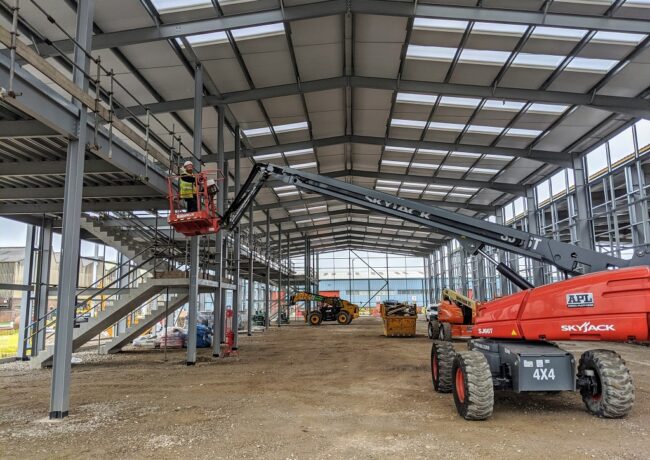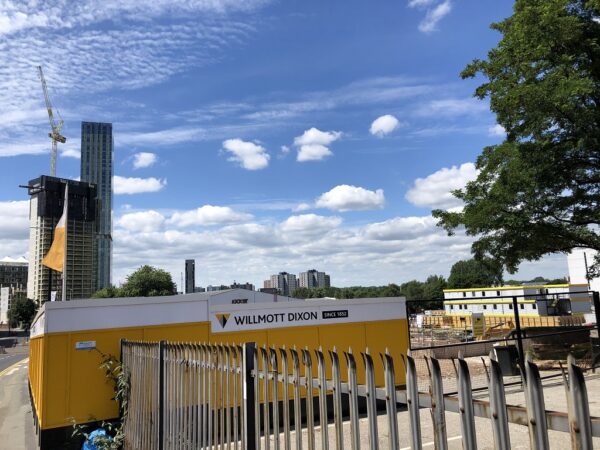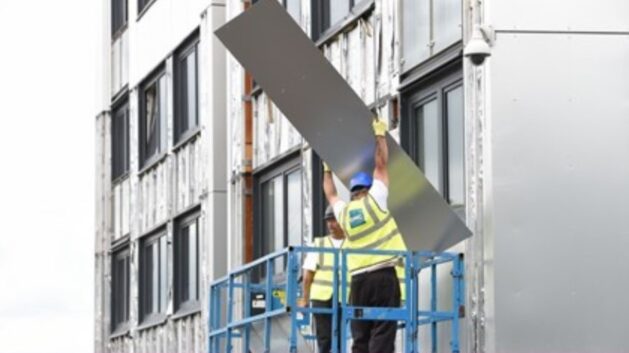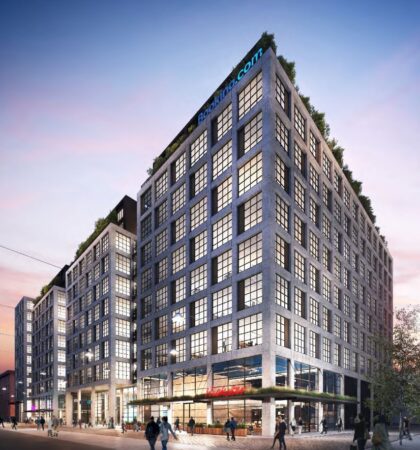IN FOCUS | Industry battles to weather materials storm
Worrying shortages of building materials are contributing to soaring costs, lengthy lead-in times and project delays heaping pressure on the development community.
The list of problems facing the construction sector makes for troubling reading, industry professionals told Place North West.
“Rampant cost inflation in a generally fixed-price environment will quickly erode supply chain margins,” according to Rick Willmott, group chief executive at national contractor Willmott Dixon.
“The unavailability of materials will delay project completions and capital projects may no longer be financially viable, leading to a hiatus in contract awards.”
Cement, timber and steel are among the materials becomingly increasingly difficult to source, the industry reports. A complex combination of factors is driving this and project delays are likely if the issues persist.
Among the factors causing supplies to dwindle are manufacturing hold-ups caused by the pandemic, which have elongated lead-in times for the delivery of certain building materials, and high demand prompted by the Government’s desire for the country to build its way out of an economic hole.
Some contractors say they are waiting for between 12-14 weeks for steel deliveries, compared with six-to-eight weeks in normal, pre-pandemic, circumstances, said Martin Bennett, partner at building consultancy Ward Williams Associates.
The nationwide steel shortage follows British Steel’s decision to close its order book last month, citing overwhelming demand. “It is not easy at the moment,” Bennett said.
Price uplift
The shortage of basic building materials has caused prices to soar. Bennett said contractors are being forced to pay a 10%-15% premium for certain items at the moment.
And steel is not the only commodity in short supply. Sweden, which supplies much of the UK’s timber products, has reported record levels of production but current stock levels are at their lowest in more than 20 years, according to the Timber Trade Federation.
Meanwhile, Brexit and its associated red tape are delaying delivery of products from Europe and the cost of imports from further afield is also being driven up.
Tom Forder, head of project management at design agency Loft, told Place North West that the firm has just paid US$14,000 (just under £10,000) to have a container shipped from China. Last year, Loft paid US$2,000 for the same shipment.
“It is a perfect storm,” added Mike Tyler, business development manager at the North West Construction Hub.
Tyler is advising public sector clients to get their ducks in a row early to mitigate against the cost and impact of delivery delays for cement, steel and timber, and consult with contractors about how best to lessen the impact of the chaotic materials market.
“We are telling clients to take advantage of the pre-construction programme and get orders placed for items with long lead-in times. If you leave it too late, it will impact on the programme,” Tyler said.
North West-based group Eric Wright Construction is in constant dialogue with its clients as it attempts to find solutions to supply chain pressures on its jobs.
The contractor is seeking to help its clients make early decisions “to avoid more significant price hikes”, while also stockpiling certain products for itself to ensure it has what it needs when it needs it.
James Eager, director at Eric Wright Construction, said: “On live projects, we have worked collaboratively with our supply chain partners to ensure that procurement and commitments are made at the earliest possible stage, storing materials on site in some instances, well in advance of the date they are required on site.”
Cladding woes
One of the items developers may want to consider ordering first is cladding. Some contractors have been quoted a six-month lead in for the product recently, according to Bennett, as fresh Government safety guidelines in the wake of the Grenfell tower fire in 2017 have forced developers to upgrade their building façades.
The wait for cladding is also causing consternation at Eric Wright, which has been told by suppliers that products ordered now would not arrive until 2022.
“Not only are costs increasing due to supply not being able to meet demand, but lead in times for certain materials are now increasing drastically,” Eager said.
Profit squeeze
Delays and increased costs could eat into the margins of companies up and down the supply chain. As a result, some developers are choosing not to start on site until things have settled down.
“Large projects are getting planning consent but instead of going ahead and starting on site, developers are being cautious and taking stock,” said Stephen Hodder, chairman of architecture studio Hodder + Partners.
Viability is a real concern, especially in places where margins are usually tight. Liverpool, where Vinci Construction is halfway through a two-year remediation project at the 23-acre Festival Gardens site, is one of those places.
“We have got supply chain pressures we haven’t seen the likes of for more than 10 years,” said Garry Bowker, construction director at Vinci.
“It will be interesting to see how the material price inflation impacts on the viability of some schemes. That is only going to further compound the viability problem.”
As suppliers and contractors continue to weather the storm, they will be keeping their fingers crossed that the pressures they are currently facing will ease soon, but there is no guarantee of that.
“It’s hard to know if this will be long term [situation] or whether a ‘settling down’ will occur,” said Eager. “The impact on development appraisals and viability of projects will be seriously affected if the current situation continues.”
The uncertainty ahead is perhaps the most frustrating thing for developers but there is optimism within the property industry that, if the high demand sustains, this will create more work and jobs, said Paul Birch, commercial manager at developer Novo.
“This is on the basis that the material issues and supply chain performance are as a result of a sudden sharp increase in demand during a time when supply is recovering from lockdown and Covid-19 impacts and not an indication of a systemic issue as a result of Brexit,” he warned.
The good news is that projects already under construction are less likely to be affected by the ongoing supply chain issues, according to Mike Ingall, chief executive of developer Allied London.
Ingall told Place North West that Allied’s Enterprise City scheme in Manchester – much of which has been on site for well over a year – has not felt the effects of price increases or shortages in the supply of steel and timber because the firm had already secured all of its materials.
However, he did concede that developers preparing to start on site may need to rethink their procurement strategies.
Concerned about the rising price of imports with Brexit on the horizon, Allied procured the vast majority of materials required to build Manchester Goods Yard from local suppliers, Ingall added.
In the face of current materials shortages, developers could consider swapping out hard-to-source materials with more readily available ones, or reusing building frames instead of demolishing them and starting from scratch, he said.
“If you are agile and nimble enough, you can design around procurement issues.”







